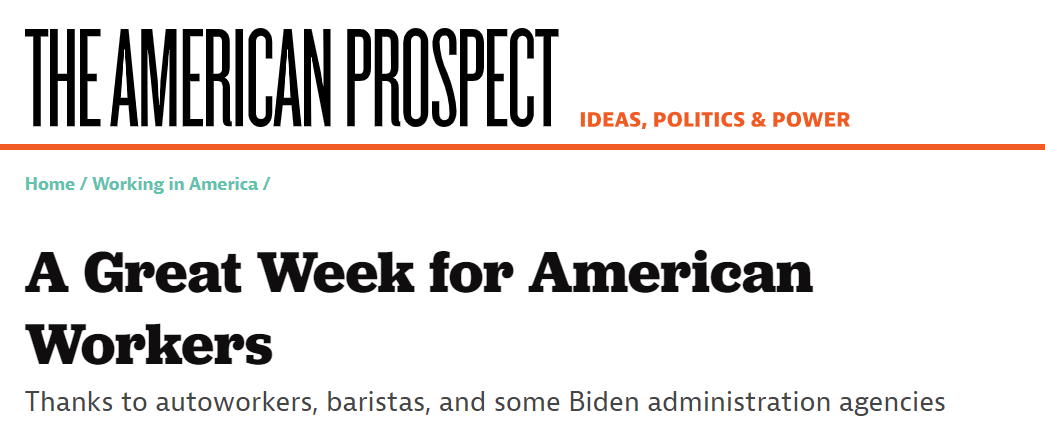Welcome to DU!
The truly grassroots left-of-center political community where regular people, not algorithms, drive the discussions and set the standards.
Join the community:
Create a free account
Support DU (and get rid of ads!):
Become a Star Member
Latest Breaking News
General Discussion
The DU Lounge
All Forums
Issue Forums
Culture Forums
Alliance Forums
Region Forums
Support Forums
Help & Search
General Discussion
Related: Editorials & Other Articles, Issue Forums, Alliance Forums, Region ForumsA Great Week for American Workers

https://prospect.org/labor/2024-04-29-great-week-for-american-workers/

Volkswagen plant employee and local UAW president Steve Cochran hugs his son Gray Cochran as they celebrate winning a vote to join the UAW, April 19, 2024, in Chattanooga, Tennessee.
Over the past 50 years, you can count on the fingers of one hand the number of weeks that have actually been great for American workers. It was just under half a century ago that California gave collective-bargaining rights to farmworkers (which at the time meant Cesar Chavez’s United Farm Workers) for the first time, since they’d been excluded from coverage under the 1935 National Labor Relations Act (NLRA). Fast-forward to 2018, when teachers in Republican states like West Virginia and Kentucky went on strike (with parental support) to successfully compel their states to increase school funding and decrease class sizes; and 2019, when a handful of Senate Democrats, chiefly Ohio’s Sherrod Brown, succeeded in amending a rewrite of NAFTA that actually gave workers a modicum of power. In the past couple of years, the new rank-and-file-elected regimes at both the Teamsters and the United Auto Workers won historically good contracts at, respectively, United Parcel Service and the Big Three automakers.
Those are the high points. In general, however, it’s pretty much been disaster after disaster for five decades: Reagan busting the air traffic controllers’ union, four failed congressional attempts to make the NLRA more functional, even more failed attempts to raise the federal minimum wage (stuck at $7.25 for the past 15 years), the passage of NAFTA, the enactment of permanent normal trade relations with China, and the relentless, sickening decline in the share of American workers who belong to unions, which now stands at 10 percent, and a bare 6 percent among private-sector workers. That decline correlates well with the shrinking of the American middle class. However, the seven days between Friday, April 19, and Thursday, April 25, saw a succession of worker victories that was almost breathtaking in its scope.
Two of those victories were the direct result of worker mobilizations. On Friday, the UAW won a recognition election at Volkswagen’s Chattanooga factory by a 73 to 27 percent margin, in an election where fully 84 percent of the eligible workers voted. Workers evidently viewed the UAW’s landmark victory in its strike several months earlier against General Motors, Ford, and Stellantis as proof positive that the union could raise their wages and benefits. They ignored the pleas of six Southern governors that the union would subvert “Southern values,” which most workers apparently understood to mean “low-wage work sustained by a lack of worker power.” The new UAW leadership, headed by president Shawn Fain, had made sure to keep the strike against the Big Three and the unprecedented contract they won in the public eye, and that leadership then appropriated $40 million to unionize factories in the South—historically, the graveyard of unionization efforts.

Last Thursday also saw the first bargaining session between the union of Starbucks baristas and their employer. In a joint statement, both sides said they made “significant progress” toward a model contract for Starbucks stores. Just as the new leadership at the UAW had mobilized thousands of its members to strike the Big Three, so the Starbucks baristas had mostly self-organized the more than 300 outlets that have voted to go union, despite the determined opposition of the company, which illegally fired a number of its employees for their involvement in the organizing campaign. Eventually, the grit and determination of those baristas to stick with their campaign, along with the company’s scorched-earth resistance, threatened to give Starbucks the kind of bad name that could alienate its clientele. Earlier this year, the company announced it would finally commence bargaining with its workers over a national contract.
snip
InfoView thread info, including edit history
TrashPut this thread in your Trash Can (My DU » Trash Can)
BookmarkAdd this thread to your Bookmarks (My DU » Bookmarks)
2 replies, 230 views
ShareGet links to this post and/or share on social media
AlertAlert this post for a rule violation
PowersThere are no powers you can use on this post
EditCannot edit other people's posts
ReplyReply to this post
EditCannot edit other people's posts
Rec (5)
ReplyReply to this post
2 replies
 = new reply since forum marked as read
Highlight:
NoneDon't highlight anything
5 newestHighlight 5 most recent replies
= new reply since forum marked as read
Highlight:
NoneDon't highlight anything
5 newestHighlight 5 most recent replies
A Great Week for American Workers (Original Post)
Celerity
Apr 30
OP
Stargazer99
(2,600 posts)1. Republicans are not happy...poor rich guys...must pay a decent wage-now will come the threats
that they will go out of business or some other gaslighting to scare those that can not do critical thinking
Hotler
(11,497 posts)2. I don't think it's the money as much as it is the empowerment of the workers.
Workers being able to have a voice and stand up for themselves really bothers employers.
Anyway, go labor. ![]()